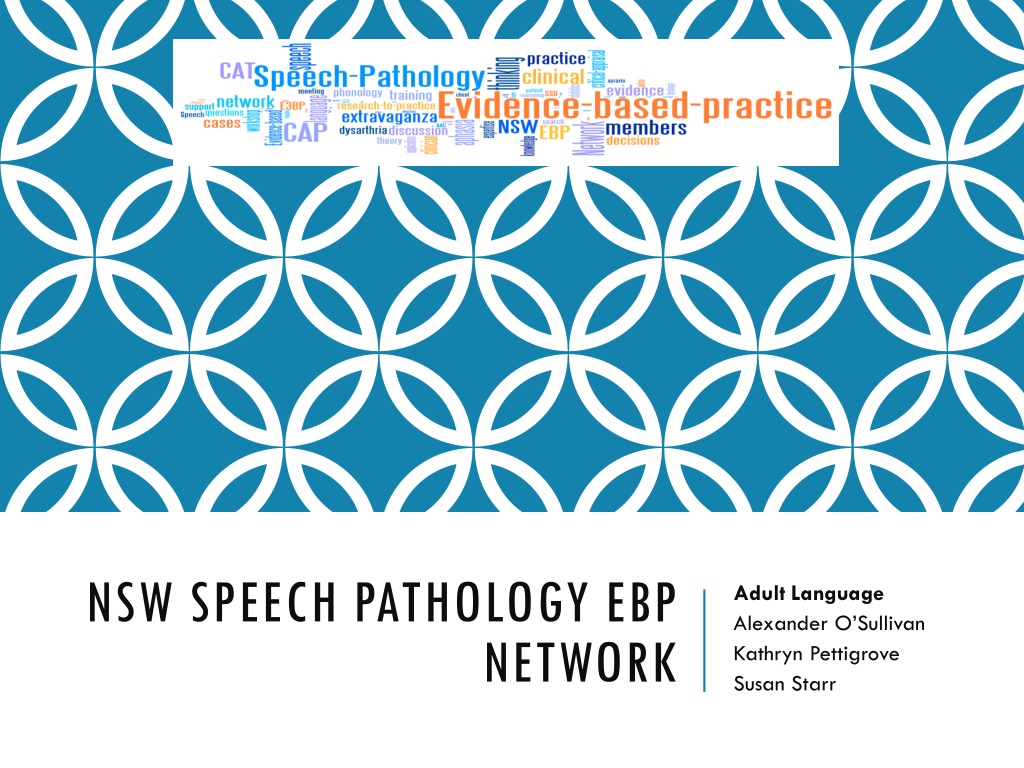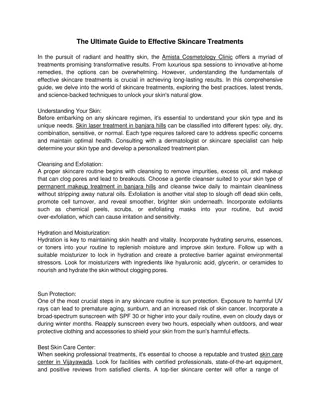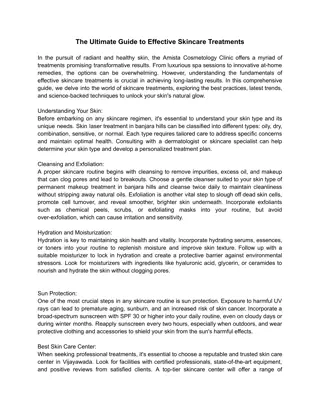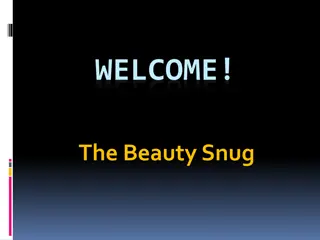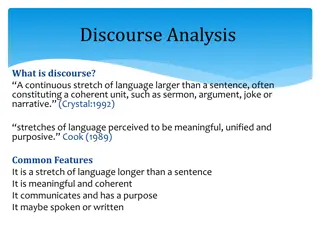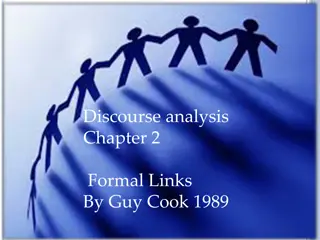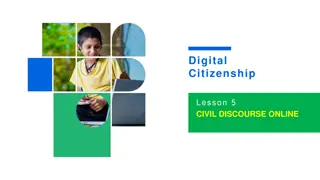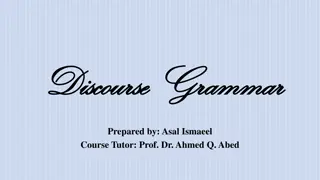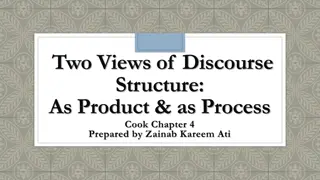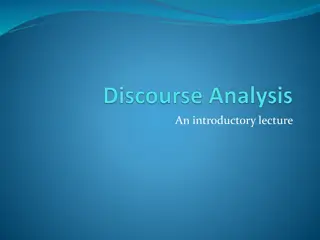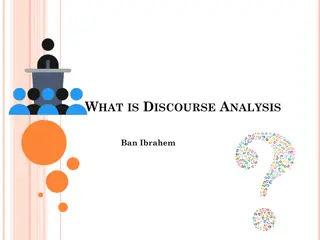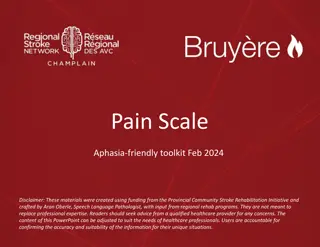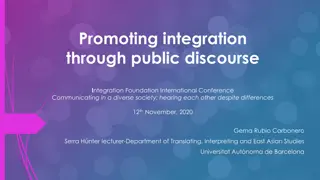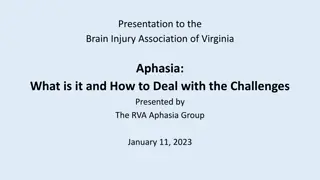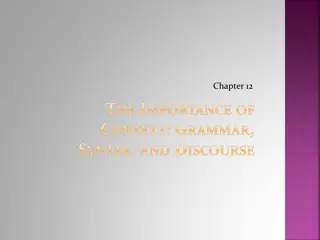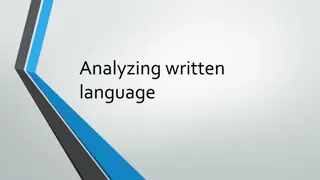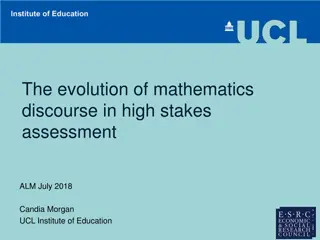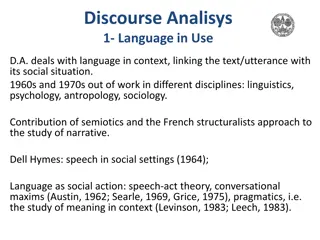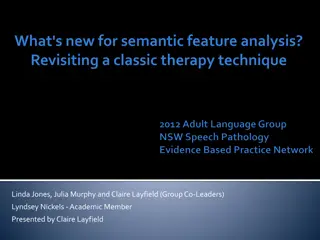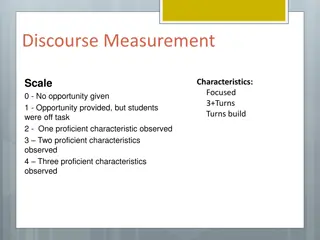Evidence-Based Practices in Discourse Treatments for Aphasia
This research review explores the effectiveness of discourse treatments for aphasia, focusing on improvements in discourse that lead to better outcomes for individuals with aphasia. Various treatment techniques and outcome measures are discussed, highlighting the potential benefits of specific interventions like Attentive Reading and Constrained Summarisation (ARCS) and Modified Response Elaboration Training (MRET). The feasibility of these treatments, session durations, participant profiles, and genre-specific changes in discourse are examined in detail. While the evidence supports potential narrative structure improvements and reduced discourse errors, the research also points out the lack of standardized protocols and functional outcome measures for clinical use.
Download Presentation

Please find below an Image/Link to download the presentation.
The content on the website is provided AS IS for your information and personal use only. It may not be sold, licensed, or shared on other websites without obtaining consent from the author. Download presentation by click this link. If you encounter any issues during the download, it is possible that the publisher has removed the file from their server.
E N D
Presentation Transcript
NSW SPEECH PATHOLOGY EBP Adult Language Alexander O Sullivan Kathryn Pettigrove Susan Starr NETWORK
CLINICAL QUESTION 2018 Is there any evidence that discourse treatments in aphasia improve discourse, and in turn lead to better outcomes for people with aphasia? If so, which treatments have evidence, and under which circumstances did they work? (i.e. type/severity of aphasia, dose/intensity etc) What discourse assessment tools were used and would they be appropriate for clinical use?
A little more conversation, a little less singe-word naming therapy
SUMMARY OF PAPERS FOUND 22 relevant papers identified Included 1 RCT (NARNIA) Lots of case-series or single-case designs Mostly feasibility studies
TREATMENT TECHNIQUES Specific training in micro/macro structure Attentive Reading and Constrained Summarisation (ARCS) Modified Response Elaboration Training (MRET) Augmentative/Alternative Communication approaches to discourse Script therapies Generally poorly described protocols insufficient information to implement in your own clinical practice.
FEASIBILITY 30-60 minute sessions 1-4 sessions per week 4-20 total sessions No group treatment identified Participants generally had mild or moderate aphasia and only mild receptive impairments One study with PPA (logopenic variant)
OUTCOMES May improve narrative structures Possible generalisation to sentence and word-level Reduction in discourse errors Changes are genre-specific (e.g. narrative, procedural, etc.)
OUTCOME MEASURES Taxonomy of compensatory behaviours (Penn 1987) % cohesion/coherence (Nicholas & Brookshire 1993) Correct Information Units (no and %) Type-token ration (Wambaugh 2013) Number of mazes, content words, t-units Speech rate Curtin University Discourse Protocol (Whitworth 2013) Not many functional/participation/QOL scores
FEASIBILITY OF MEASUREMENT IN CLINICAL PRACTICE? Anecdotally clinicians don t perform detailed transcriptions and analysis Time-consuming. Often lead researchers delegate to PhD students Research Groups dedicated to this at present: - FOQUSAphasia (www.bpsda.com) - Current survey into clinician practices: (https://redcap.uits.iu.edu/surveys/?s=LLF3LD7AAX)
IMPLICATIONS FOR CLINICAL PRACTICE Do you assess discourse as part of your clinical practice? Do you assess over different discourse genres (i.e. beyond the Cookie Theft)? Do you specifically target discourse production in people with aphasia? Number of promising techniques, with potential for below-level generalization.
WHAT IS OUR CLINICAL GROUP CURRENTLY WORKING ON/PLANS FOR THE FUTURE? 2019 topic is an update to 2014 topic what evidence-based screeners which identify or exclude new communication impairments in under 15 minutes currently exist, and what is the evidence supporting their use (by either SPs or Non-SPs)?
THREE WORTHY CONTENDERS Quick Aphasia Battery (Wilson, et al 2018) Language Screening Test (Flowers, et al 2014) Aboriginal Communication Assessment After Brain Injury (ACAABI Armstrong, et al forthcoming)
INTERESTED IN THE GROUP? Kathryn and Alex stepping down next year as co-leaders Direct enquiries to Susan.Starr@svha.org.au Most of the work done online Meetings can be attended using Virtual Meeting Room
